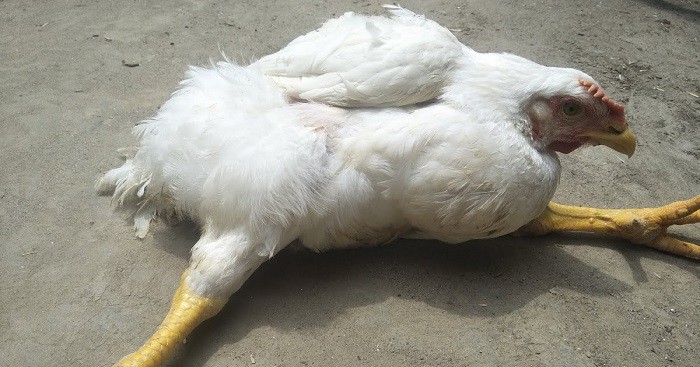
Marek Disease In Poultry
Marek’s Disease in Poultry: A Farmer’s Full Guide
In poultry farming, few words cause more fear than Marek’s Disease. It’s one of those silent threats that can wipe out months of hard work and investment without warning.
At AfriMach Animal Feeds, we know the heartbreak farmers feel when healthy birds start showing paralysis, poor growth, or sudden death. Let’s take a deep look at this disease — its causes, symptoms, prevention, and how good feeding and management can help reduce the risks.
What Is Marek’s Disease?
Marek’s Disease is a highly contagious viral disease caused by Marek’s disease virus (MDV), a herpesvirus that affects chickens. It primarily attacks the nervous system, eyes, skin, and internal organs, leading to paralysis and tumours.
Once the virus enters your flock, it can persist in dust, feathers, and litter for many months, making it difficult to remove completely.
According to research from the University of Guelph, the virus can survive even in disinfected environments, which is why prevention is far better than trying to control an outbreak.
Birds Most at Risk
Young birds between 3 and 30 weeks of age are the most vulnerable, though older chickens can also get infected.
The University of Maryland Extension notes that backyard and small-scale flocks are often hit hardest because biosecurity and vaccination are sometimes overlooked.
Key Symptoms of Marek’s Disease
Farmers should always monitor their flocks for signs like:
-
Paralysis in one or both legs or wings (birds may sit with legs stretched in opposite directions)
-
Twisting of the neck or loss of balance
-
Loss of weight despite normal feeding
-
Vision problems or greyish eyes
-
Drop in egg production
-
Sudden deaths in apparently healthy birds
If you suspect Marek’s, confirm it with laboratory testing, since symptoms can look similar to Newcastle Disease or Avian Leukosis. (Colorado State University
How It Spreads
The virus spreads mainly through feather dust, dander, and air. Infected birds shed the virus continuously from their feather follicles.
Once it settles in a poultry house, it becomes extremely hard to eliminate — it can survive for months in litter or on equipment.
Good ventilation, regular cleaning, and limiting visitor access to your poultry area are essential.
Vaccination: The Only Proven Protection
There is no cure for Marek’s Disease — only prevention through vaccination and management.
The World Organisation for Animal Health (WOAH) recommends that all chicks be vaccinated within 24 hours after hatching.
Important vaccination points:
-
Always vaccinate chicks before exposure to older birds.
-
Use vaccines stored and handled properly (incorrect temperature destroys vaccine effectiveness).
-
After vaccination, give birds 2 weeks of stress-free environment for immunity to develop.
Biosecurity Measures
As the Penn State Extension explains, once the virus enters your farm, it’s nearly impossible to remove completely.
You can, however, prevent spread and protect new flocks:
-
Clean poultry houses thoroughly between batches.
-
Disinfect tools, feeders, and footwear regularly.
-
Keep age groups separate — don’t mix chicks with older birds.
-
Control rodents, insects, and visitors to prevent disease carriers.
-
Remove feathers and dust often; the virus hides there.
Feeding and Immune Support
While feed alone can’t stop the virus, good nutrition strengthens the immune system, helping vaccinated birds resist infection more effectively.
At AfriMach Animal Feeds, we design poultry feeds rich in:
-
Vitamin E and Selenium – for immunity and stress resistance
-
Vitamin A and D3 – for tissue repair and bone strength
-
Amino acids and proteins – for growth and recovery after vaccination
-
Minerals and probiotics – for gut health and nutrient absorption
Healthy, well-fed birds are more resilient and less likely to show severe symptoms if exposed.
What to Do If You Suspect an Outbreak
If Marek’s Disease appears on your farm:
-
Immediately isolate sick birds from healthy ones.
-
Contact a veterinarian or local livestock officer for testing and advice.
-
Disinfect the entire poultry area, including feeders, drinkers, and equipment.
-
Do not sell or move birds from infected flocks.
-
Keep detailed records — they help in tracing and managing future flocks.
Marek Disease
Marek’s Disease in poultry is a battle every farmer can win with knowledge, preparation, and discipline.
Vaccinate, maintain strict hygiene, and feed your flock well — because prevention always costs less than loss.
At AfriMach Animal Feeds, we stand with every farmer who values their flock’s health and productivity. Our goal is to help you grow stronger, smarter, and more resilient against the challenges that come your way.